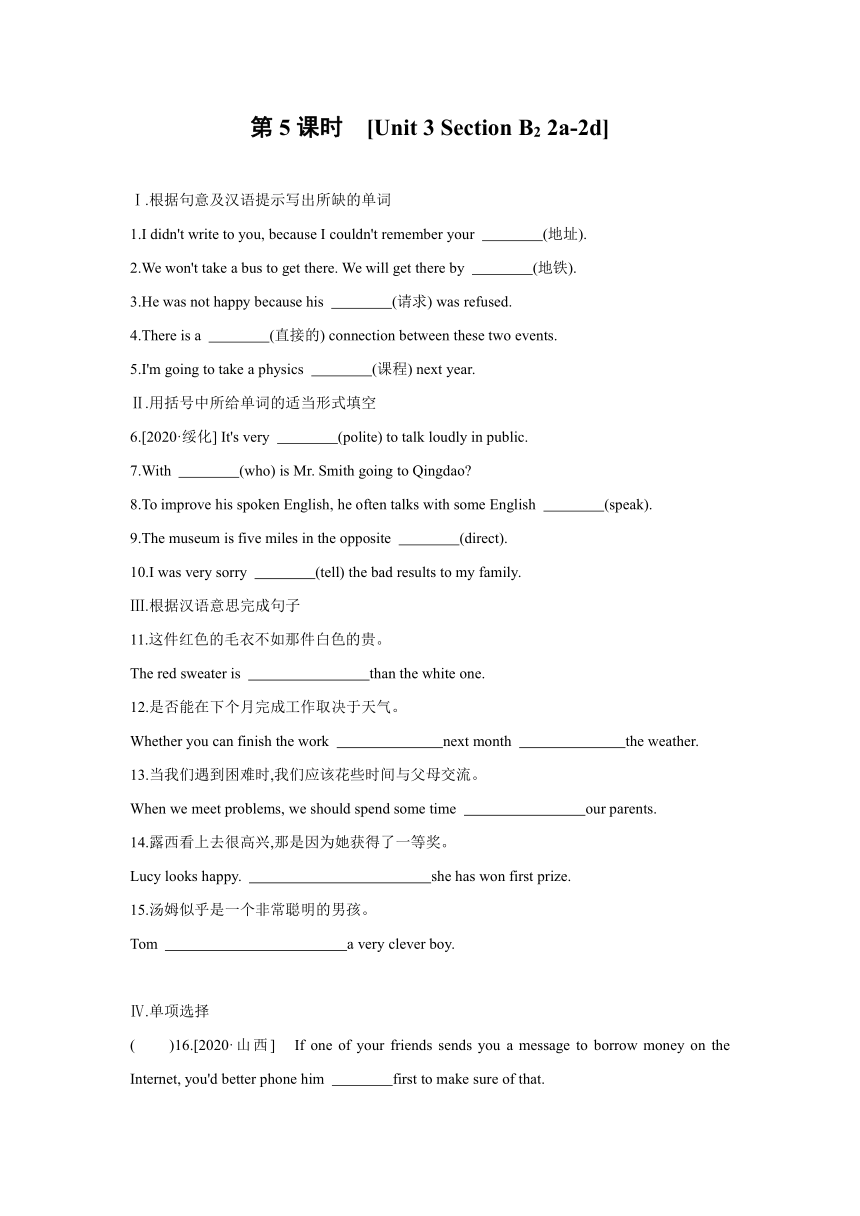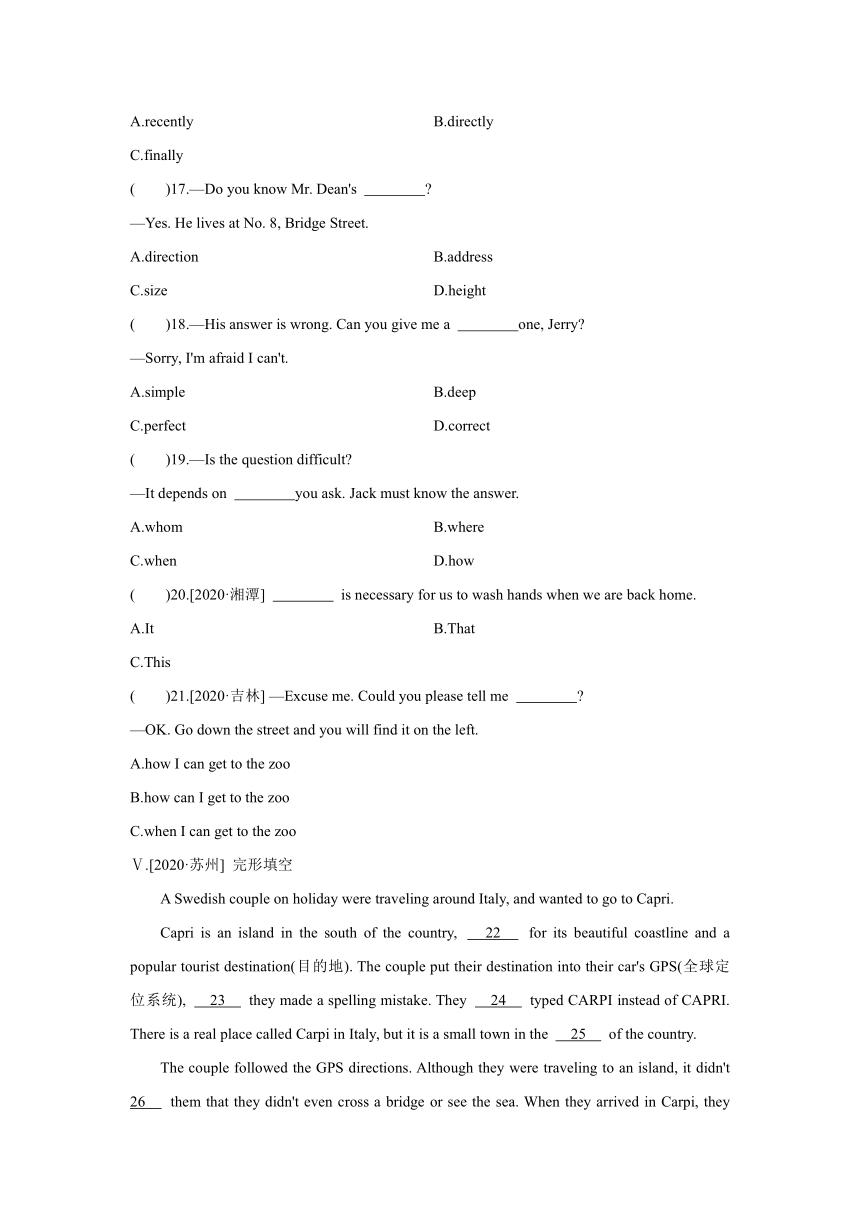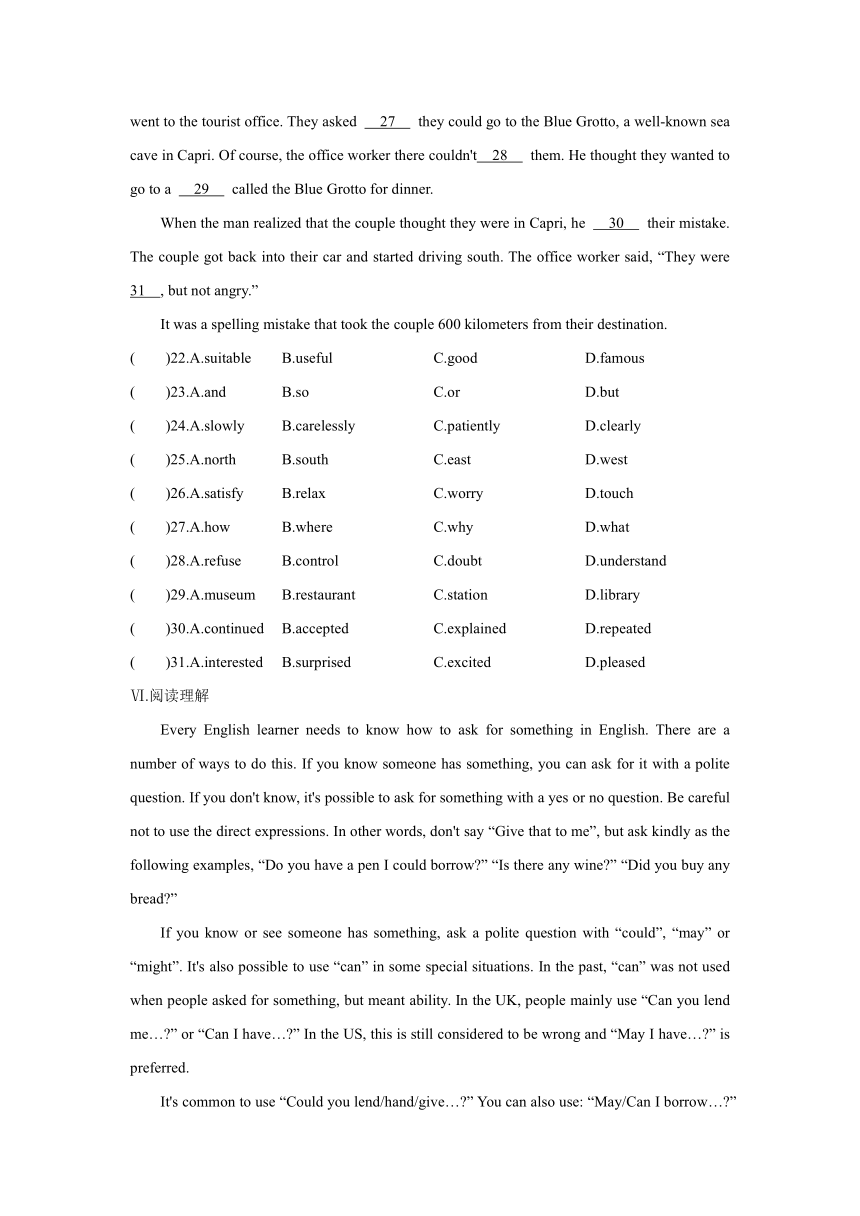人教版英语九年级上册 Unit 3 Could you please tell me where the restrooms are? Section B2 2a-2d 课课练(含答案)
文档属性
| 名称 | 人教版英语九年级上册 Unit 3 Could you please tell me where the restrooms are? Section B2 2a-2d 课课练(含答案) |  | |
| 格式 | docx | ||
| 文件大小 | 45.5KB | ||
| 资源类型 | 教案 | ||
| 版本资源 | 人教新目标(Go for it)版 | ||
| 科目 | 英语 | ||
| 更新时间 | 2022-07-14 16:17:24 | ||
图片预览



文档简介
第5课时 [Unit 3 Section B2 2a-2d]
Ⅰ.根据句意及汉语提示写出所缺的单词
1.I didn't write to you, because I couldn't remember your (地址).
2.We won't take a bus to get there. We will get there by (地铁).
3.He was not happy because his (请求) was refused.
4.There is a (直接的) connection between these two events.
5.I'm going to take a physics (课程) next year.
Ⅱ.用括号中所给单词的适当形式填空
6.[2020·绥化] It's very (polite) to talk loudly in public.
7.With (who) is Mr. Smith going to Qingdao
8.To improve his spoken English, he often talks with some English (speak).
9.The museum is five miles in the opposite (direct).
10.I was very sorry (tell) the bad results to my family.
Ⅲ.根据汉语意思完成句子
11.这件红色的毛衣不如那件白色的贵。
The red sweater is than the white one.
12.是否能在下个月完成工作取决于天气。
Whether you can finish the work next month the weather.
13.当我们遇到困难时,我们应该花些时间与父母交流。
When we meet problems, we should spend some time our parents.
14.露西看上去很高兴,那是因为她获得了一等奖。
Lucy looks happy. she has won first prize.
15.汤姆似乎是一个非常聪明的男孩。
Tom a very clever boy.
Ⅳ.单项选择
( )16.[2020·山西] If one of your friends sends you a message to borrow money on the Internet, you'd better phone him first to make sure of that.
A.recently B.directly
C.finally
( )17.—Do you know Mr. Dean's
—Yes. He lives at No. 8, Bridge Street.
A.direction B.address
C.size D.height
( )18.—His answer is wrong. Can you give me a one, Jerry
—Sorry, I'm afraid I can't.
A.simple B.deep
C.perfect D.correct
( )19.—Is the question difficult
—It depends on you ask. Jack must know the answer.
A.whom B.where
C.when D.how
( )20.[2020·湘潭] is necessary for us to wash hands when we are back home.
A.It B.That
C.This
( )21.[2020·吉林] —Excuse me. Could you please tell me
—OK. Go down the street and you will find it on the left.
A.how I can get to the zoo
B.how can I get to the zoo
C.when I can get to the zoo
Ⅴ.[2020·苏州] 完形填空
A Swedish couple on holiday were traveling around Italy, and wanted to go to Capri.
Capri is an island in the south of the country, 22 for its beautiful coastline and a popular tourist destination(目的地). The couple put their destination into their car's GPS(全球定位系统), 23 they made a spelling mistake. They 24 typed CARPI instead of CAPRI. There is a real place called Carpi in Italy, but it is a small town in the 25 of the country.
The couple followed the GPS directions. Although they were traveling to an island, it didn't 26 them that they didn't even cross a bridge or see the sea. When they arrived in Carpi, they went to the tourist office. They asked 27 they could go to the Blue Grotto, a well-known sea cave in Capri. Of course, the office worker there couldn't 28 them. He thought they wanted to go to a 29 called the Blue Grotto for dinner.
When the man realized that the couple thought they were in Capri, he 30 their mistake. The couple got back into their car and started driving south. The office worker said, “They were 31 , but not angry.”
It was a spelling mistake that took the couple 600 kilometers from their destination.
( )22.A.suitable B.useful C.good D.famous
( )23.A.and B.so C.or D.but
( )24.A.slowly B.carelessly C.patiently D.clearly
( )25.A.north B.south C.east D.west
( )26.A.satisfy B.relax C.worry D.touch
( )27.A.how B.where C.why D.what
( )28.A.refuse B.control C.doubt D.understand
( )29.A.museum B.restaurant C.station D.library
( )30.A.continued B.accepted C.explained D.repeated
( )31.A.interested B.surprised C.excited D.pleased
Ⅵ.阅读理解
Every English learner needs to know how to ask for something in English. There are a number of ways to do this. If you know someone has something, you can ask for it with a polite question. If you don't know, it's possible to ask for something with a yes or no question. Be careful not to use the direct expressions. In other words, don't say “Give that to me”, but ask kindly as the following examples, “Do you have a pen I could borrow ” “Is there any wine ” “Did you buy any bread ”
If you know or see someone has something, ask a polite question with “could”, “may” or “might”. It's also possible to use “can” in some special situations. In the past, “can” was not used when people asked for something, but meant ability. In the UK, people mainly use “Can you lend me… ” or “Can I have… ” In the US, this is still considered to be wrong and “May I have… ” is preferred.
It's common to use “Could you lend/hand/give… ” You can also use: “May/Can I borrow… ” “Could/Can you lend me… ” “May I have… ” Do not begin a sentence with “please”, but you can add “please” at the end of the sentence to be polite.
( )32.What can we ask if we know someone has something
A.A direct question.
B.A no question.
C.A yes question.
D.A polite question.
( )33.What can Lucy say politely if she wants some coffee
A.Pass me some coffee.
B.Is there any coffee
C.Give me some coffee.
D.Bring some coffee to me.
( )34.What didn't people say when they wanted something in the past
A.Can I use your dictionary
B.Could you lend me your bike
C.May I try your computer now
D.Might I take your car today
( )35.Which of the following is a correct polite expression according to the passage
A.Do you give me any milk, please
B.Please could you lend me your ruler
C.May I have some tea, please
D.Please could you hand me a knife
( )36.What's the main idea of the passage
A.How to ask for something politely.
B.What to do when we are polite.
C.How to describe our ideas.
D.What to do with our language problems.
答案
Ⅰ.1.address 2.underground 3.request
4.direct 5.course
Ⅱ.6.impolite 7.whom 8.speakers
9.direction 10.to tell
Ⅲ.11.less expensive 12.or not; depends on
municating with
14.That is because 15.seems to be
Ⅳ.16.B 句意:如果你的一个朋友在网络上给你发信息向你借钱,你最好首先直接给他打电话去确认这件事。recently意为“最近”;directly意为“直接地”;finally意为“最后”。由句意可知选 B。
17.B 18.D 19.A
20.A 句意:我们回家就洗手是很有必要的。句中的it作形式主语,不定式to wash hands作真正的主语。故选A。
21.A 句意:“打扰一下,请问你能告诉我怎样到达动物园吗 ”“行。沿着这条街道走,你会在左手边找到它。”此句为特殊疑问句作宾语从句,宾语从句要用陈述语序,所以排除B选项;由句意可知选A。
Ⅴ.【主旨大意】 一对夫妇要到意大利南部的卡普里岛(Capri)旅游,但在导航上错误地输入了Carpi,导致他们开车到了北部的一个小镇。两地相差600公里。
22.D suitable意为“合适的”;useful意为“有用的”;good意为“好的”;famous意为“著名的”。句意:Capri 是这个国家南部的一个岛屿,因它美丽的海岸线和受欢迎的旅游目的地而闻名。由句意可知选D。
23.D and表示并列、承接或递进关系;so表示因果关系;or表示选择关系;but表示转折关系。句意:夫妇俩把他们的目的地输入到汽车的全球定位系统中,但是他们犯了一个拼写错误。由句意可知选D。
24.B 句意:他们不小心输入了CARPI而不是CAPRI。由前句“they made a spelling mistake”可知,他们输错了目的地,这应该是粗心造成的。
25.A 由第二段中的“Capri is an island in the south of the country”以及倒数第二段中“The couple got back into their car and started driving south.”可知,夫妇俩要去的Capri在意大利南部,当他们发现到了错的地方后,就重新朝南开。由此推断,他们到的Carpi小镇在意大利的北部。
26.C satisfy意为“(使)满意”;relax意为“(使)放松”;worry意为“(使)担心”;touch意为“感动”。按照常理,到岛上去会经过桥并且看到大海,但是这对粗心大意的夫妇并没有意识到这一点。一路上没有经过桥,也没有看到大海,这些并没有让他们感到担心。由句意可知选C。
27.A
28.D 由前文“…they could go to the Blue Grotto, a well-known sea cave in Capri.”可知,夫妇二人询问的景点在Capri,因此,CARPI的工作人员不明白他们在问什么。
29.B
30.C continue意为“继续”;accept意为“接受”;explain意为“解释”;repeat意为“重复”。句意:当工作人员意识到这对夫妇以为他们是在Capri后,他向夫妇二人解释了这个错误。由句意可知选C。
31.B
Ⅵ.32.D 由第一段中的“If you know someone has something, you can ask for it with a polite question.”可知,如果你知道某人有某物,你可以有礼貌地询问,并恳求给予。
33.B 由第一段可知,向别人寻求某物时,不要直接表达,而是要用疑问句并且要有礼貌。
34.A 由第二段中的“In the past, ‘can’ was not used when people asked for something, but meant ability.”可知,在过去,人们想要某物时,不用can,can 只是表示能力。故选A。
35.C
36.A 由文章开头“Every English learner needs to know how to ask for something in English. There are a number of ways to do this.”并通读全文可知,文章主要谈论如何有礼貌地寻求某物。
Ⅰ.根据句意及汉语提示写出所缺的单词
1.I didn't write to you, because I couldn't remember your (地址).
2.We won't take a bus to get there. We will get there by (地铁).
3.He was not happy because his (请求) was refused.
4.There is a (直接的) connection between these two events.
5.I'm going to take a physics (课程) next year.
Ⅱ.用括号中所给单词的适当形式填空
6.[2020·绥化] It's very (polite) to talk loudly in public.
7.With (who) is Mr. Smith going to Qingdao
8.To improve his spoken English, he often talks with some English (speak).
9.The museum is five miles in the opposite (direct).
10.I was very sorry (tell) the bad results to my family.
Ⅲ.根据汉语意思完成句子
11.这件红色的毛衣不如那件白色的贵。
The red sweater is than the white one.
12.是否能在下个月完成工作取决于天气。
Whether you can finish the work next month the weather.
13.当我们遇到困难时,我们应该花些时间与父母交流。
When we meet problems, we should spend some time our parents.
14.露西看上去很高兴,那是因为她获得了一等奖。
Lucy looks happy. she has won first prize.
15.汤姆似乎是一个非常聪明的男孩。
Tom a very clever boy.
Ⅳ.单项选择
( )16.[2020·山西] If one of your friends sends you a message to borrow money on the Internet, you'd better phone him first to make sure of that.
A.recently B.directly
C.finally
( )17.—Do you know Mr. Dean's
—Yes. He lives at No. 8, Bridge Street.
A.direction B.address
C.size D.height
( )18.—His answer is wrong. Can you give me a one, Jerry
—Sorry, I'm afraid I can't.
A.simple B.deep
C.perfect D.correct
( )19.—Is the question difficult
—It depends on you ask. Jack must know the answer.
A.whom B.where
C.when D.how
( )20.[2020·湘潭] is necessary for us to wash hands when we are back home.
A.It B.That
C.This
( )21.[2020·吉林] —Excuse me. Could you please tell me
—OK. Go down the street and you will find it on the left.
A.how I can get to the zoo
B.how can I get to the zoo
C.when I can get to the zoo
Ⅴ.[2020·苏州] 完形填空
A Swedish couple on holiday were traveling around Italy, and wanted to go to Capri.
Capri is an island in the south of the country, 22 for its beautiful coastline and a popular tourist destination(目的地). The couple put their destination into their car's GPS(全球定位系统), 23 they made a spelling mistake. They 24 typed CARPI instead of CAPRI. There is a real place called Carpi in Italy, but it is a small town in the 25 of the country.
The couple followed the GPS directions. Although they were traveling to an island, it didn't 26 them that they didn't even cross a bridge or see the sea. When they arrived in Carpi, they went to the tourist office. They asked 27 they could go to the Blue Grotto, a well-known sea cave in Capri. Of course, the office worker there couldn't 28 them. He thought they wanted to go to a 29 called the Blue Grotto for dinner.
When the man realized that the couple thought they were in Capri, he 30 their mistake. The couple got back into their car and started driving south. The office worker said, “They were 31 , but not angry.”
It was a spelling mistake that took the couple 600 kilometers from their destination.
( )22.A.suitable B.useful C.good D.famous
( )23.A.and B.so C.or D.but
( )24.A.slowly B.carelessly C.patiently D.clearly
( )25.A.north B.south C.east D.west
( )26.A.satisfy B.relax C.worry D.touch
( )27.A.how B.where C.why D.what
( )28.A.refuse B.control C.doubt D.understand
( )29.A.museum B.restaurant C.station D.library
( )30.A.continued B.accepted C.explained D.repeated
( )31.A.interested B.surprised C.excited D.pleased
Ⅵ.阅读理解
Every English learner needs to know how to ask for something in English. There are a number of ways to do this. If you know someone has something, you can ask for it with a polite question. If you don't know, it's possible to ask for something with a yes or no question. Be careful not to use the direct expressions. In other words, don't say “Give that to me”, but ask kindly as the following examples, “Do you have a pen I could borrow ” “Is there any wine ” “Did you buy any bread ”
If you know or see someone has something, ask a polite question with “could”, “may” or “might”. It's also possible to use “can” in some special situations. In the past, “can” was not used when people asked for something, but meant ability. In the UK, people mainly use “Can you lend me… ” or “Can I have… ” In the US, this is still considered to be wrong and “May I have… ” is preferred.
It's common to use “Could you lend/hand/give… ” You can also use: “May/Can I borrow… ” “Could/Can you lend me… ” “May I have… ” Do not begin a sentence with “please”, but you can add “please” at the end of the sentence to be polite.
( )32.What can we ask if we know someone has something
A.A direct question.
B.A no question.
C.A yes question.
D.A polite question.
( )33.What can Lucy say politely if she wants some coffee
A.Pass me some coffee.
B.Is there any coffee
C.Give me some coffee.
D.Bring some coffee to me.
( )34.What didn't people say when they wanted something in the past
A.Can I use your dictionary
B.Could you lend me your bike
C.May I try your computer now
D.Might I take your car today
( )35.Which of the following is a correct polite expression according to the passage
A.Do you give me any milk, please
B.Please could you lend me your ruler
C.May I have some tea, please
D.Please could you hand me a knife
( )36.What's the main idea of the passage
A.How to ask for something politely.
B.What to do when we are polite.
C.How to describe our ideas.
D.What to do with our language problems.
答案
Ⅰ.1.address 2.underground 3.request
4.direct 5.course
Ⅱ.6.impolite 7.whom 8.speakers
9.direction 10.to tell
Ⅲ.11.less expensive 12.or not; depends on
municating with
14.That is because 15.seems to be
Ⅳ.16.B 句意:如果你的一个朋友在网络上给你发信息向你借钱,你最好首先直接给他打电话去确认这件事。recently意为“最近”;directly意为“直接地”;finally意为“最后”。由句意可知选 B。
17.B 18.D 19.A
20.A 句意:我们回家就洗手是很有必要的。句中的it作形式主语,不定式to wash hands作真正的主语。故选A。
21.A 句意:“打扰一下,请问你能告诉我怎样到达动物园吗 ”“行。沿着这条街道走,你会在左手边找到它。”此句为特殊疑问句作宾语从句,宾语从句要用陈述语序,所以排除B选项;由句意可知选A。
Ⅴ.【主旨大意】 一对夫妇要到意大利南部的卡普里岛(Capri)旅游,但在导航上错误地输入了Carpi,导致他们开车到了北部的一个小镇。两地相差600公里。
22.D suitable意为“合适的”;useful意为“有用的”;good意为“好的”;famous意为“著名的”。句意:Capri 是这个国家南部的一个岛屿,因它美丽的海岸线和受欢迎的旅游目的地而闻名。由句意可知选D。
23.D and表示并列、承接或递进关系;so表示因果关系;or表示选择关系;but表示转折关系。句意:夫妇俩把他们的目的地输入到汽车的全球定位系统中,但是他们犯了一个拼写错误。由句意可知选D。
24.B 句意:他们不小心输入了CARPI而不是CAPRI。由前句“they made a spelling mistake”可知,他们输错了目的地,这应该是粗心造成的。
25.A 由第二段中的“Capri is an island in the south of the country”以及倒数第二段中“The couple got back into their car and started driving south.”可知,夫妇俩要去的Capri在意大利南部,当他们发现到了错的地方后,就重新朝南开。由此推断,他们到的Carpi小镇在意大利的北部。
26.C satisfy意为“(使)满意”;relax意为“(使)放松”;worry意为“(使)担心”;touch意为“感动”。按照常理,到岛上去会经过桥并且看到大海,但是这对粗心大意的夫妇并没有意识到这一点。一路上没有经过桥,也没有看到大海,这些并没有让他们感到担心。由句意可知选C。
27.A
28.D 由前文“…they could go to the Blue Grotto, a well-known sea cave in Capri.”可知,夫妇二人询问的景点在Capri,因此,CARPI的工作人员不明白他们在问什么。
29.B
30.C continue意为“继续”;accept意为“接受”;explain意为“解释”;repeat意为“重复”。句意:当工作人员意识到这对夫妇以为他们是在Capri后,他向夫妇二人解释了这个错误。由句意可知选C。
31.B
Ⅵ.32.D 由第一段中的“If you know someone has something, you can ask for it with a polite question.”可知,如果你知道某人有某物,你可以有礼貌地询问,并恳求给予。
33.B 由第一段可知,向别人寻求某物时,不要直接表达,而是要用疑问句并且要有礼貌。
34.A 由第二段中的“In the past, ‘can’ was not used when people asked for something, but meant ability.”可知,在过去,人们想要某物时,不用can,can 只是表示能力。故选A。
35.C
36.A 由文章开头“Every English learner needs to know how to ask for something in English. There are a number of ways to do this.”并通读全文可知,文章主要谈论如何有礼貌地寻求某物。
同课章节目录
- Unit 1 How can we become good learners.
- Section A
- Section B
- Unit 2 I think that mooncakes are delicious!
- Section A
- Section B
- Unit 3 Could you please tell me where the restroom
- Section A
- Section B
- Unit 4 I used to be afraid of the dark.
- Section A
- Section B
- Unit 5 What are the shirts made of?
- Section A
- Section B
- Review of Units 1-5
- Unit 6 When was it invented?
- Section A
- Section B
- Unit 7 Teenagers should be allowed to choose their
- Section A
- Section B
- Unit 8 It must belong to Carla.
- Section A
- Section B
- Unit 9 I like music that I can dance to.
- Section A
- Section B
- Unit 10 You're supposed to shake hands.
- Section A
- Section B
- Review of Units 6-10
- Unit 11 Sad movies make me cry.
- Section A
- Section B
- Unit 12 Life is full of the unexpected
- Section A
- Section B
- Unit 13 We're trying to save the earth!
- Section A
- Section B
- Unit 14 I remember meeting all of you in Grade 7.
- Section A
- Section B
- Review of Units 11-14
